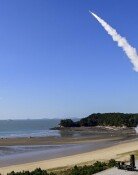[Opinion] `Superpower U.S.` Will It Continue?
[Opinion] `Superpower U.S.` Will It Continue?
Posted November. 15, 2001 09:18,
As if September 11 and the anthrax scare were not enough, New Yorkers had to experience yet another tragedy after the crash of the American Airlines flight. The economy, too, has reached its worst state in this generation. A year and a half ago, the U.S. was invincible. That unshakeable American confidence and peace is now becoming a question.
The changing image of the U.S. makes Korean tourists worry about their safety. Many Korean students are considering studying abroad in another English-speaking nation. It is, of course, not even a question whether the events of the past two months have made many Americans nervous and anxious.
Recently, I attended a wedding which took place on a small island below the Bay Bridge in San Francisco, a potentially targeted city. My peers whom I met at the wedding hall confessed that their wives and girlfriends decided not to attend the wedding. Couple weeks ago, a passenger sitting next to me in a subway saw a large envelope below the next seat. The passenger slowly got up and moved to another section.
The fact that airplanes have landed safely 1,000,000 times in the last year in America does not make the news. The actual count of anthrax-related deaths in the U.S. is four. Watching the news, however, one gets the impression that the death toll reaches 40,000. There are many more people who die from the flu than from anthrax. Americans are learning to adapt to new threats. Yet, the reality is that this is no more of a threat than the danger we face when we get in the car or cross the street. The U.S. is a safe place to visit.
During my first stay in Korea in 1980, my families frequently asked me whether I was safe. They did so because the media often reported Korean students and laborers demonstrating, throwing Molotov cocktails, running into the riot police, or burning the flag. I explained to my family that those incidents occurred only in certain sections. In 1994 when North Korea threatened to make Seoul a `burning hell,` I stayed in Seoul for a year. Many people in the world including Koreans live under some kind of threat, and as the Koreans learned to do, these people adapted to life under these threats.
The most obvious change that visitors will notice in the U.S. is the tightened security in the airports and public buildings. The search line in airports are very long and even the elderly must undergo bag and body inspections. But the five times that I have been in the airports since September 11, the lines in American airports are not long compared to Inchon International or Kimpor Airport.
There are many things in the U.S. which have not changed. Despite the confrontation with a new and unprecedented threat, partisanship in the government is still the same. After the initial nonpartisan atmosphere, the Republicans and Democrats cannot agree on how to address the new challenge facing America. The Republicans think that the best way to deal with the falling economy is not to help the unemployed and the poor, but to cut taxes for corporations and the rich.
The threat confronting the U.S. has created an opportunity to reorganize the international system for the purpose of dealing with the terrorists over a wide area. Russia and China have become potential allies of the U.S. in the war against terrorism while Germany and Japan are preparing to supply military support for the first time and operating as regular nations.
Unfortunately, George W. Bush administration is putting its energies into missile defense, which is a bottomless money drain that actually is not so effective, but denying scientific evidence for global warming. The U.S. is also trying to withdraw from the Anti-Ballistic Missile Treaty. As for the Kyoto Accord on global warming, the U.S. remains indifferent. It remains to be seen whether pluralism, which is in its infancy, will replace the unilateralism of the Bush administration.
The U.S. will remain for some time a singular super power that forcefully responds to attacks. The problem is how the U.S. uses its power in dealing with the threat against peace and prosperity and what kind of a role it plays in the international system.
Peter Beck (Korea Economic Institute of America, Washington D.C.)
beckdonga@hotmail.com







